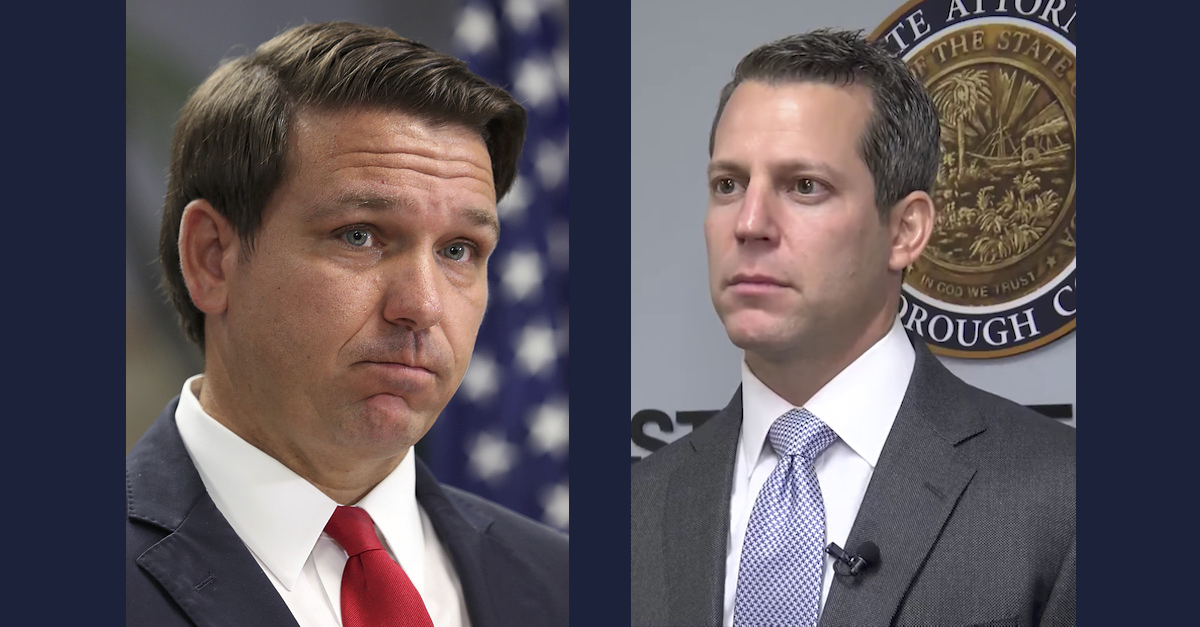
Ron DeSantis (R) and Andrew Warren (L)
Florida Gov. Ron DeSantis (R) likely will not testify at a trial over his decision to oust a Democratic local prosecutor who refused to prosecute abortion cases. Attorneys for ousted Hillsborough State Attorney Andrew Warren told a judge on Wednesday that they do not intend to call the governor during their case in chief.
The Florida governor wanted a federal judge to block Warren from calling him to the witness stand, until Warren’s legal team all but rendered the question moot.
If Warren decides to call DeSantis during the rebuttal case, Senior U.S. District Judge Robert Hinkle indicated that he would revisit the controversy at that time.
“What can I tell you? You won the motion,” Hinkle told the governor’s legal team.
If the judge were to grant an “unexpected” and “unlikely” request by Warren to call the governor for a rebuttal case, Hinkle said that he would not stop the trial to allow appellate review of that decision.
Hinkle, a Bill Clinton appointee, will be presiding over a bench trial in Tallahasee beginning on Nov. 29, 2022.
In August, DeSantis removed Warren from office after the twice-elected local prosecutor made clear that he would not pursue criminal cases for violating Florida’s new 15-week abortion ban. DeSantis framed the issue as one of “neglect of duty,” but Warren cast the move in a lawsuit as an unconstitutional power grab, substituting his own discretion as an elected prosecutor with the governor’s agenda.
Before trial, the Florida governor argued that the threat to separation of powers came from forcing him to explain those actions under oath at a trial.
“Few issues pose a ‘more serious’ ‘threat to the separation of powers’ than ‘compelling the personal appearance of’ high-ranking executive officials ‘for interrogation’ in federal court,” the governor’s attorney Henry C. Whitaker wrote in a legal brief earlier this month. “Yet Mr. Warren has pointedly reserved the possibility of compelling the Governor and his Chief of Staff to testify at trial.”
In their written response, Warren’s lawyers dinged the governor on his reluctance to speak about the client — at least, when the TV cameras are off.
“Ron DeSantis has never been short on things to say about his suspension of Andrew Warren,” attorney Jean-Jacques Cabou wrote. “Defendant DeSantis announced Mr. Warren’s suspension in a made-for-TV rally at the Hillsborough County Sheriff’s Office on August 4, 2022. Later that day he went on Fox News for a one-on-one segment with Tucker Carlson about the suspension, speaking for several minutes in response to the question ‘Why did you do it?'”
In the segment, DeSantis told Carlson that Warren “actually signed letters saying he wouldn’t enforce laws against transgender surgeries for minors, laws protecting the right to life, and then he has all these policies in his agency that are called presumptive non-prosecution policies.” The governor repeated those justifications in a statement in Hialeah, Florida, and again, during a televised gubernatorial debate when he sought reelection.
Warren’s legal team asserted that DeSantis showed “no apparent sense of irony” in extensively arguing that he should not have to speak under oath on a subject upon which he had “previously been delighted to hold forth.” They argued that the governor should not be shielded “from the legal consequences of his choice to be absent from a case about which he has unique knowledge.”
DeSantis’ ouster of Warren immediately had major policy change consequences. Warren’s replacement did a 180 and decided to seek the death penalty against Matthew Terry, whose murder trial the Law&Crime Network covered. Terry was swiftly convicted of murdering Kay Baker, leaving the death penalty case in an unusual place pre-sentencing as the Warren-DeSantis dispute carries on in the courts, as legal experts have noted.
Sheriff Chad Chronister, of Hillsborough County, sought to quash his subpoena, but the need for that motion was obviated when Warren agreed to use his deposition at trial instead.